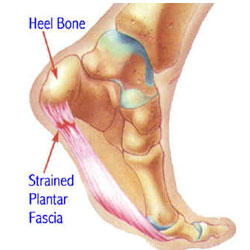Giants’ QB Eli Manning Hobbled by a Heel?

NY Giants quarterback Eli Manning was diagnosed Monday with plantar fasciitis. Manning may have been injured by taking a poorly placed step on his right foot during a pass attempt. Further evaluation confirmed the diagnosis of plantar fasciitis, which would still allow Manning to play next weekend,although he may have some discomfort in the foot for some time.
The plantar fascia is a thick band of strong tissue that runs along the bottom on the foot from the heel to the base of the toes. It helps to support the arch of the foot by acting as a tie-rod, which undergoes tension as the foot bears weight. Plantar fasciitis occurs when the fascia becomes irritated and inflamed.
Risk factors for plantar fasciitis include:
*Foot arch problems (both flat foot and high arches)
*Obesity
*Running
* Sudden weight gain
* Tight Achilles tendon (the tendon connecting the calf muscles to the heel) and calf muscle tightness
The main symptom of plantar fasciitis is heel pain (although pain in the ball of the foot is also possible). It is worse first thing in the morning, presenting as a sharp pain upon arising, gets somewhat better over the course of the day, and then worsens again with dull pain in the evenings or with prolonged standing or walking.

Treatment usually consists of:
* Anti-inflammatory medications
* Heel and calf stretching exercises
* Night splints, which keep the foot at a 90 degree angle to prevent contraction of the fascia
* Shoe inserts to support the arch of the foot.
Conservative therapy works most of the time, although it may take 9 months to 2 years for symptoms to resolve. Some physicians may offer corticosteroid injections to decrease the inflammation, however they are quite painful, and may only relieve symptoms for a variable period of time.
For more information:
| Resounding Health(tm) Plantar fasciitis |
























0 comments